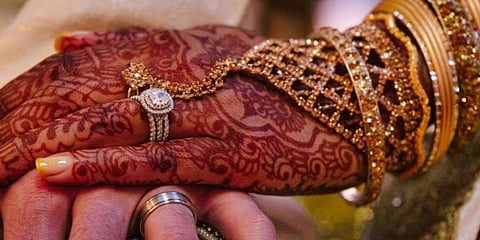

NEW DELHI: As the Uttarakhand government is set to increase the maximum jail term under the state’s anti-conversion law to ten years, couples and civil society organisations express apprehension that the move will instill more fear among interfaith couples and further help the police to criminalise interfaith marriages. Apart from Uttarakhand, BJP-ruled states Madhya Pradesh, Uttar Pradesh, Karnataka, Haryana and Himachal Pradesh have passed anti-conversion law that bans religious conversion solely for the purpose of marriage.
With several states implementing anti-conversion laws, there is an increasing sense of fear and scepticism among interfaith couples, says Asif Iqbal, co-founder of NGO ‘Dhanak for Humanity, a platform to extend help for interfaith couples. “We get an average of 1000 inquiries yearly from interfaith couples requesting guidance and legal help. In Delhi and Haryana, we help couples to reach the ‘safe homes’ run by state governments,” said Iqbal, adding that the number of couples seeking help has decreased after the stringent conversion law came into place in states.
“Couples are extremely scared as ‘love jihad’ has become a political issue now. As the governments also start talking about it openly, it emboldens the police too. Even getting rented accommodation is difficult for them. Currently, we have accommodated two couples in our office,” he said. With the conversion law in place in most states, Iqbal points out that many couples elope to states where they can escape the laws of their states and avoid pressure from family and harassment from vigilante groups.
Most couples prefer Delhi, as there is no conversion law in place in the national capital. “For couples who are coming from a different state, it will take three months to register the marriage. First, they have to stay for a month and procure identification certificates such as Aadhaar, driving license or valid proof. Registering the marriage will take a minimum three months. The officials make the process very difficult and try to jeopardise the entire process,” he says.
If the Special Marriage Act (SMA) is the viable route for interfaith couples to register marriages, without conversion. The 30-day notice period under SMA and notices being sent from Sub-Divisional Magistrate’s (SDM) offices to the couple’s permanent address make the process gruelling. The addresses will be put up at the SDM’s notice board too.
Since couples have to wait for more than a month for registration of marriage, it leaves enough room for harassment from family and administration, says Parveen, who married Ram Singh Yadav after facing opposition from her family.
The couple decided to explore the provision of the Special Marriage Act after Parveen’s family got her engaged. However, when they approached the sub-divisional magistrate in South Delhi’s Dwarka, the couple was discouraged. “When we went for verification a month after applying, the Dwarka SDM warned us that notices will be sent to our homes. He even asked me to convert to Hinduism and conduct the marriage at Arya Samaj,” said Parveen.